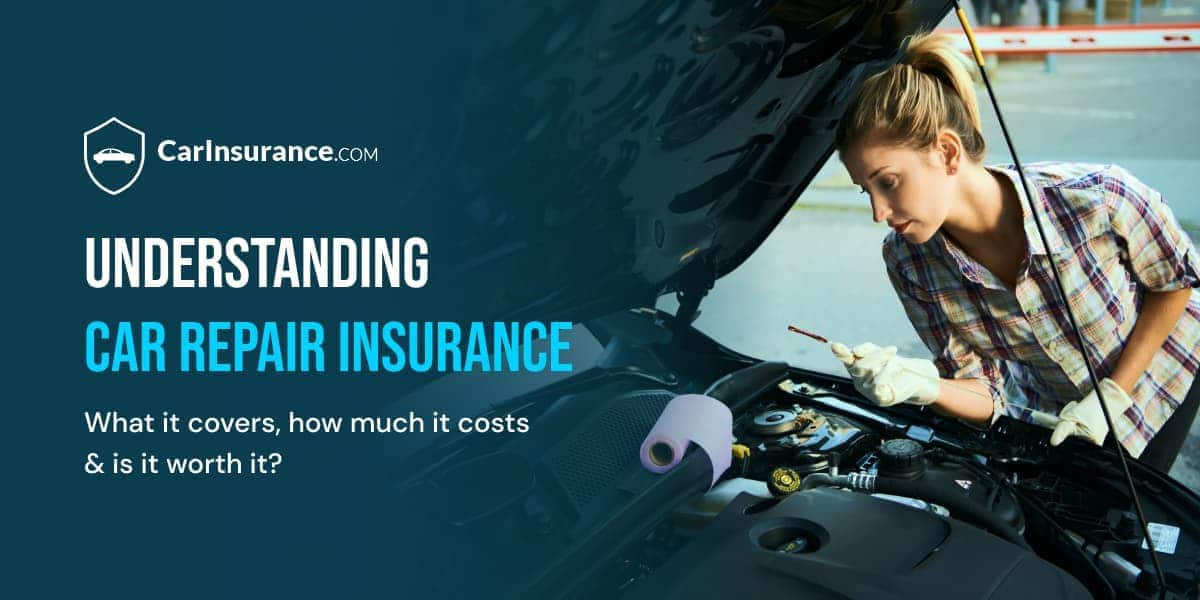If you’ve ever had the unpleasant experience of having your car damaged in an accident, or you’ve found your car in your driveway — under a tree — one of your first thoughts was probably, “does car insurance cover repairs?”
This is why car repair insurance exists.
By car repair insurance, we’re talking about the type of coverage you’ll need to pay for those repairs.
If you’re in the market for auto insurance and want the peace of mind of making sure car repairs will be covered, please read on.
- Mechanical breakdown insurance protects you from having to pay for expensive repairs from wear and tear that causes breakdowns.
- You need liability insurance for damage you may do to others and their property. But purchase comprehensive and collision coverage to ensure your car repairs are covered.
- The national average for comprehensive coverage is $192 a year and collision coverage is $526 per year.
- If you’re in an accident and it’s not your fault, the other driver’s insurance company should pay for your car repairs.

Type of car insurance that covers repairs
First, when we refer to car repair insurance, we aren’t talking about mechanical breakdown insurance.
Mechanical breakdown insurance is a type of insurance that protects you from costly repairs from wear and tear that causes breakdowns. Some insurers offer that, and you’ll often see TV ads touting that type of insurance.
By car repair insurance, we’re talking about good old-fashioned, indispensable conventional car insurance — getting a car repair after something goes wrong, like a car wreck, a toppling tree, a hailstorm or having your car stolen.
If you’re looking for the right coverage to fix a problem like that, it helps to know your car repair insurance terminology.
If you want to make sure your car repairs will be covered, you’ll need collision insurance and comprehensive insurance. But liability is important for damage you may do to others and their property.
You can go even further and get additional coverage. For instance, gap coverage will make sure that if you’re in a total loss accident and you owe more than your car is worth, your auto insurer will pay the difference. Gap insurance keeps you from getting stuck paying your lender money for a car you no longer drive.
How much does car repair insurance cost?
As for how much it costs to have collision and comprehensive insurance, it may seem like a lot, but it’s a drop in the bucket compared to shelling out thousands of dollars or more after a serious accident.
According to rate analysis, the national average for comprehensive coverage is $255 per year, for collision it is $687 per year for a total of $942 annual premium. Adding liability coverage to that and you’ve got what most people call “full coverage” that will cost, on average $1,607 annually.
How much will repairs cost if you have a car repair insurance policy?
Of course, it’s important not to fall into that trap of thinking, “Well, car repair insurance will pay for everything. If I have a car accident, I won’t have to pay anything.” That isn’t likely to be the case.
When buying a new car insurance policy, you’ll want to pay attention to these three insurance terms.
- Premium. This is the yearly fee for your car insurance.
- Deductible. That’s the money you’ll pay toward car repairs when making a claim. For example, say that you have a $500 deductible. If you crash into a tree, and the mechanic says it’ll cost $1,000 to fix your car, you’ll have to pay $500 to your mechanic, and your insurer will pay the remaining $1,000.
- Out-of-pocket costs. That $500 deductible would be considered your out-of-pocket costs.
As for that deductible, you don’t have to get a $500 deductible. You can get a deductible that is lower or higher than $500, depending on the insurance company.
But here’s an important expert tip to remember: the lower the deductible, the higher the premium.
While it would be wonderful to have no deductible, you’ll have to ask yourself if you want to pay a much higher monthly premium. Likewise, while it would be wonderful to pay a super-low premium every month, you’ll want to be careful about doing that. If you were in a wreck, you must make sure you can afford to pay your deductible out-of-pocket.
If you’re in an accident and you’re not at fault, the at-fault driver’s insurance should kick in and cover your car repair.
Is car repair insurance worth it?
When an accident happens and you need to repair your car, having the right car insurance can save you thousands of dollars. Being adequately covered to take care of car repairs is worth it.
How to file a car repair insurance claim
If something does go wrong, like you drive into a deep pothole or have a fender bender with another vehicle, you will need to file a car repair insurance claim.
So how do you file a car repair claim?
Once you’re safe, have ensured there are no injuries and the police report has been filed simply go to your insurer’s app or call your insurance company and report the accident.
If you can, take photos of your car’s damage.
You’ll be asked questions like your name, your contact information, your vehicle information, what happened and so on. You may be asked to send photos of the car’s damage. They’ll ask if the police were involved and took down a report.
You’ll discuss whether your insurance policy will pay for a rental car for you to drive around while you’re waiting for your car repair. Be aware you would need to carry rental reimbursement to have this perk.
From there, you’ll likely wait for an insurance adjuster to come by (it may not be that day, but it’ll be soon) to assess the vehicle’s damages. After that, you’ll either get an estimate from the insurer on how much the repairs will cost or be asked to take the car to a body shop for an estimate. That estimate will be turned in to the insurance company.
Once the insurer has everything worked out, you’ll likely end up at the garage, paying your deductible and the mechanic will bill your insurer for the rest. This is, again, assuming you were at fault. If somebody else was, their insurance should be paying for your damages.
If you’re wondering how the insurance claims process has changed during the pandemic, we’ve got you covered here.
When is it not worth filing a car repair insurance claim?
As it turns out, there are several times when you might be better off paying for repairs and not using your car repair insurance.
1) If you damage your car, and it is going to cost less to fix it than your deductible – maybe you have a dent or a scratch that you want to be removed – you’re probably better off not making a claim. If you file a claim, you’ll be out of the deductible but will likely see a premium increase at your next renewal.
2) If you were not at fault, do not file a car insurance claim with your company. Instead, make your claim with the at-fault party’s insurance provider. This way you won’t have a deductible to pay and it is their claims history that gets dinged with the claim and not yours.
Use your insurance if you need to – that’s why you have insurance, but consider using it for major items. If your car engine isn’t running well, and you need your car fixed, and you have insurance, use it. But if you’re often making minor claims to pay for, say, a dent in the side of the car or some ugly scratch on the car, that will hurt your risk assessment and your bank account on future rates.
Do I have to fix my car with the insurance money?
Let’s say your insurance company sends you the car repair insurance claims check and now you’re thinking, “you know, my car can still safely drive. Is it OK to spend this check on something else instead of repairing my car?”
If you are still paying on a car loan, you should get your car fixed. It isn’t your car until it is paid in full.
If you’ve made all the payments and own your car outright, it is generally up to you how you use the insurance payout. You want to make sure that if you aren’t getting your car repaired, it’s truly safe to drive.
Determine if the pros outweigh the cons of not making repairs. If you don’t use the check and repair the damage, say a dent in the fender, and you are in an accident later, that previous damage will be considered. For example, if you don’t fix the hail damage to your roof with the claim check and the car is later totaled out, your car’s value and payout will be reduced due to this pre-existing damage.
Is there ever a time when it isn’t worth getting the car repaired?
Yes, and often your insurance company will make that call. If your car repair costs exceed the vehicle’s value, your car will likely be declared totaled – and you’ll get a check for the amount your car is worth.
But there are other times when you may want to make that decision yourself. If you’re constantly making repairs to your car, and now a deer has run into your car, and you’re about to spend a fortune fixing this junk heap, you may want to instead not contact your insurer. Instead, you may want to retire your vehicle and buy a new car.
In other words, if the repair costs begin to feel foolish because you know your car isn’t long for this world, you should probably listen to your gut and start looking around for a replacement. And maybe decide to drop collision and comprehensive to save that portion of your premium money towards your replacement car. If you don’t plan to use the coverage for claims, no reason to pay for it.
Do I need car repair insurance if I have an extended warranty?
An extended warranty will typically cover mechanical breakdowns. Depending on the type of car warranty you purchased, it may also cover some wear and tear. But, if a tree falls on your car, for example, and busts your radiator, a car warranty will not likely cover the repair. This is where your collision and comprehensive insurance comes into action.
Final thoughts
Insurance is meant to pay for unexpected car repairs. Car repair insurance covers the unexpected. Everybody knows that certain engine components, like the serpentine belt, are going to get old and will need to be replaced. You can probably prepare your wallet for that or purchase an extended warranty. You don’t know, however, if one day your car might slide on an icy road and then careen into a food truck. It’s a lot more challenging to prepare your wallet for that.
If you think about it, auto repair insurance is really like a superhero. You hope you aren’t in any financial danger, but if you ever are, car repair insurance can save the day. Having the right insurance coverage to handle whatever life throws at you is a great financial decision, but it can also bring peace of mind.
— Geoff Williams contributed to this story.





